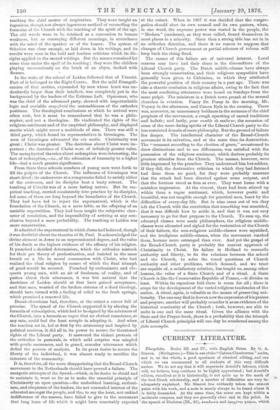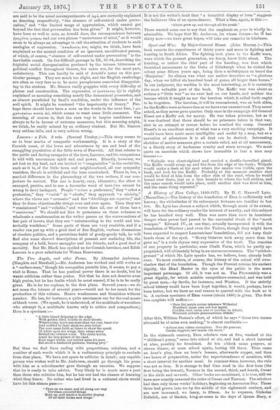CURRENT LITERATURE.
Thucydides. Books IIL and IV., with English Notes. By G. A. &nacos. (Rivingtons.)—This is one of the" Catena. Classicorum " series, and is, on the whole, a good specimen of classical editing, and one which we can recommend to all students of this very difficult author. We do not say that it will supersede Arnold's labours, which will, we believe, long continue to be highly appreciated ; but Arnold's edition, excellent as it is historically, is not quite up to the mark of the best Greek scholarship, and a number of difficulties are very in- adequately explained. Mr. Simcox has evidently taken the utmost pains with his work, and a note is nearly always to be found where it is fairly demanded. At the same time, the notes are kept within a moderate compass, and they are generally clear and to the point. In the speech of Diodotus (ILL, 42), lia•saiwole and Apext;ras 7.4sr, which are said to be the usual accompaniments of inA, are correctly explained as denoting respectively, "the absence of self-control under provo- cation," and "the limited range of appreciation, which cannot get beyond the fact that provocation has been given." It might, however, have been as well to note, as Arnold does, the correspondence between AfaX(OrtIc Vtiqcn; and our own phrase "narrowness of mind," as it would seem to be always an advantage to call the attention of students to such analogies of expression. 'Ax.reArsirix, too, might, we think, have been explained as the mental condition of an ignorant, uncultivated person, of which, of course, "absence of self-control under provocation" is the inevitable result. On the difficult passage in III., 81-84, describing the frightful social disorganisation produced by the intense bitterness of political conflict throughout Greece, the notes are, for the most part, satisfactory. This can hardly be said of Arnold's notes on this par- ticular passage. They are much too slight, and the English renderings are often so very free as to be mere paraphrases somewhat disappoint- ing to the student. Mr. Simcox really grapples with every difficulty of phrase and construction. The expression xi ii.txxpixs-co; 4E; is rightly explained as meaning something nearly like demoniacal possession, and as almost paralleled by Saul's condition, under the influence of the evil spirit. It might be rendered "the impetuosity of frenzy." Per- haps there should have been a note on the words in the next line, zaAvreavao Incovis. eisl, which seems to want some little comment. The meaning, of course is, that the sure way to inspire confidence was always to be in favour of extreme measures, but this meaning might, we think, be easily missed by an ordinary student. But Mr. Simcox very seldom fails, and is very seldom wrong.







































 Previous page
Previous page